- Home
- Allison Brennan
Cut and Run Page 2
Cut and Run Read online
Page 2
As they drove the hour to Kerrville, Lucy read the updated file on the case, then filled Nate in on what she knew.
“You know about the bones,” she said.
“Yeah. Four people shot execution-style and buried in a mass grave near the Kendall–Kerr County border in the middle of nowhere.”
Ballistics was incomplete because there was evidence of eight points of entry, but only six bullets had been recovered. Those bullets came from two different .45 pistols. The teenagers had been restrained—two sets of zip ties had been found still around their wrists—and the father had additional injuries to his skull, indicating blunt force trauma prior to the execution. Probabilities leaned to having been cold-cocked with the butt of a gun.
“Ash went above and beyond, but the FBI still has some of the best tools. Though they gave a two-month range, there’s a probability graph that shows the most likely time they were killed was between September 17 and September 27. Probabilities decrease the further away from those dates. That’s primarily from the soil samples that were collected in the area—samples that weren’t contaminated by the flood—coupled with the state of the bones and an etymology report. But it’s very difficult to pinpoint an exact date. We have nothing from Kerr County yet, only what Rachel said—they were last seen on September 21.”
“They didn’t leave the country,” Nate said.
“There’s evidence that they did.”
“I want to see it—the car driving across the border doesn’t mean they’re the people who drove it. Border Control doesn’t generally regulate who is going to Mexico.”
It was a good point, but there should be a photo of the driver as the vehicle passed, and Lucy didn’t think that the investigating detective would have made the assumption without hard evidence. “The investigators must have that information—tapes or photos from Border Control. They would have contacted the FBI attaché in Mexico with a BOLO.”
“Doesn’t the report say?”
“None of that information is in here.”
“It doesn’t sound like we have much of anything.”
“An ID is a good start,” she said, “but we need the original investigators’ reports. Who they talked to, how the money was embezzled and if any has been recovered, what evidence they have that it was Albright—over and above her leaving the country—who else she might have been close to. Her family was killed. Not to justify her murder, there is no justification, but if she had a partner and double-crossed him or her, then yes, I could see how she might be targeted. But her family? Her children? That’s … beyond cruel.”
Nate didn’t say anything for a minute, then asked, “Do you think the kid is alive?”
She was surprised at the question. “I think,” she said slowly, “that he wasn’t killed with his family. Either he wasn’t there at the time, or there was another reason to bury his body in a different place. Evidence, perhaps.”
“Who the fuck executes kids,” Nate muttered.
Nate was right, they had very little information. The original investigation began out of the Kerr County Sheriff’s Office when the Albrights were considered missing persons. Once the embezzlement came to light, Laura Williams, from the San Antonio FBI office, joined the investigation, but the information was thin: No one had seen or heard from anyone in the family after they crossed the border.
The FBI had warrants to monitor the Albrights’ bank and passports, but considering they’d left the country, there wasn’t much they could do unless someone spotted them.
Truly, with their caseload Lucy wasn’t surprised nothing more had been done. People could disappear for years, especially in another country or if they had good fake identities. Harder to do with children, but certainly not impossible. But now this was a murder investigation. The FBI investigated homicides only under limited circumstances; this multi-jurisdictional case with a federal embezzlement charge could go either way, but Lucy was glad that Rachel took it.
She wanted this case, too. Not only to find out what happened to this poor family, but because the complexity of this investigation would keep her mind off her family and Thanksgiving.
Lucy didn’t see how Ricky Albright could be alive. Where would a nine-year-old go without someone informing the authorities? Could he have been living on the street? Maybe for a short time, but for three years? There had been a missing persons report filed on the Albrights, and the US consulates and the FBI attachés in Mexico would have their identities for the BOLO. If Ricky had been picked up anywhere, he would have popped—his photo and description had been part of the original report.
Lucy didn’t care what Denise Albright had done: She vowed to get justice for the family.
She checked her messages while Nate drove. Ash Dominguez was at the gravesite with two cadaver dogs and their handlers from the Bexar County Sheriff’s Office. They were expanding the search at the gravesite, then heading to the Albright house.
He ended his message with:
I want to find that boy and give him a decent burial.
She’d talked to Ash on and off over the last two months as he worked the forensics end of the investigation and knew that he’d taken the case to heart. She would almost say he was obsessed, but in a good way. Having a crime scene investigator as smart and involved as Ash working so hard could make the difference in solving this cold case.
After filling Nate in on Ash’s plans with the dogs, she said, “There’s so much we don’t know. I don’t have a list of people they interviewed or who was even the last person to see them alive. The two detectives—Carl Chavez and Garrett Douglas—talked to a few people after Glen Albright didn’t show up to work. Didn’t treat it as a missing persons case until Denise Albright’s employer reported the embezzlement nearly a week later.” She flipped through the thin report. “After the embezzlement came to light—and the family hadn’t been found—they got a warrant and searched the house. Luggage appeared to be missing and a full garbage bag of shredded paper was found in the garage. No reservations in their names on planes, trains, et cetera. Family, friends, said they didn’t know the family was leaving town.”
“Suggesting they left in a hurry.” Nate paused. “If they left at all.”
It was clear Nate thought they’d been killed the day they went missing—and the “proof” that they left the country was wrong. If he was right, then their murder was premeditated and the killer intentionally sent the police down the wrong trail.
Lucy planned to re-interview everyone Chavez and Douglas spoke with—the principal where Glen worked, the Young family that Ricky had gone home with that Friday after school, the owner of the construction company that accused Denise Albright of embezzlement. She’d like to have Laura navigate them through the financial complexities, but Lucy didn’t know when she’d be free.
Lucy kept coming back to why Ricky Albright wasn’t buried with his family. Maybe he wasn’t at home when the killers arrived. Did they kill the family, then go back for Ricky? Yet there was no evidence that the family had been killed at their house. No blood, no sign of violence. Only that they had left in a hurry.
Had they been grabbed there? Or as they were leaving town? Maybe they’d planned to disappear for some reason … because Denise stole all that money?… and the killers followed them.
If they followed them to Mexico, they would have killed them in Mexico, where their bodies would likely never be found or identified.
Lucy frowned. She was already thinking like Nate, that the family had been killed before they went to Mexico, when so far the evidence pointed that they’d left the country and returned within a week.
What were you thinking, Denise? Were you scared? Maybe you left without thinking, then came back to turn yourself in … and then what? You had a partner? Someone who didn’t want to come clean? Killed you and your entire family?
That actually made sense. Guilt was a powerful emotion. And being on the run was hard, especially with a family.
Yet … that didn’t explain what
happened to Ricky.
Maybe Glen and Denise left Ricky behind. Or maybe the killer had a hard time shooting a child … and if that’s the case, where was he? Could a nine-year-old be convinced not to turn in the person who killed his parents?
Knowing what they knew, Lucy believed that poor Ricky Albright was most likely dead. She hoped Ash would find his body so his remaining family could have peace.
And Lucy vowed to find the person who killed them, because they deserved justice … no matter what crimes Denise Albright committed.
Chapter Two
Detective Carl Chavez was of average build, in his late forties, with dark hair just beginning to both gray and recede.
He was clearly unhappy that the FBI had taken lead on the Albright case. He slapped a folder in front of them. “There’s everything we have.”
Lucy glanced around at the uniformed officers all watching the exchange. The hostility was palpable, and Nate—who already looked and walked like the soldier he’d been—looked ready to pounce.
“Is there a place we can talk in private?” she asked.
“I really don’t know what I can tell you that’s not in the files.”
“Is Detective Douglas here?”
He shook his head. “He had a case he couldn’t drop.”
Nate spoke up for the first time. “When will he be back?”
“Don’t know. It’s an important case, this is three years old—what’s another day or two?”
“We have some questions about the case file,” she said. “You were involved in the investigation three years ago, correct? Your name is on several of the reports.”
“Yeah— It was Garrett’s case, but I assisted.”
When he realized that Lucy wasn’t going to budge on the conversation, he motioned for them to follow him down the hall and to a small conference room. He sat down, leaned back in the chair. “What can I help you with?”
Lucy sat across from him; Nate continued to stand. She could feel the anger rolling off him, but if Chavez sensed it, he didn’t react.
“Is this all you have?”
“Everything’s there. We sent your people what we had at the time.”
“I was hoping in your follow-up that you might have additional information.”
“Once we learned the Albrights went to Mexico, we moved it to inactive. And since it was a federal embezzlement case, it really wasn’t on our radar.”
Chavez was very relaxed. Maybe it was the town—small county, not a lot of crime. They averaged less than one murder a year, maybe they just didn’t know how to proceed with such violent deaths.
Lucy asked, “Can you walk us through the time frame? From when you were called in, who you talked to?”
He motioned to the files. “It’s all in there.”
“I read the files.”
“So I don’t see what the problem is. What else do you want to know?”
“The report says the first call was from the high school principal—Glen and his daughters didn’t show up at school. Was that when you caught the case?”
He nodded, rocked back and forth on the two back legs of the chair. “We went to the house on a welfare check late Monday morning, September 24. Determined that the Escalade, registered to Denise Albright, was gone. The cars registered to the husband and the daughter were both there. No one was home, house locked tight. No neighbors close by—the house is in the middle of a couple of acres. We talked to one neighbor that was listed as an emergency contact for the kids at school, a young couple with a baby, but they hadn’t seen the Albrights on Friday or over the weekend. Didn’t find it odd, because like I said, the houses are remote.”
Lucy was skimming the reports as Chavez spoke. Most of it she’d seen before, in the copy sent to the FBI. She didn’t see how they made a leap from seeing the Albrights were not home to checking the border and was about to ask, but Chavez continued.
“We went to Mrs. Albright’s employer next,” he said. “They were very concerned because she was supposed to be in a meeting Monday and hadn’t called in. So we put a BOLO out for the Escalade and the family—we initially thought they’d been in an accident, maybe went away for the weekend and got into trouble. Something like that. Talked to Mr. Albright’s sister in Dallas, she was worried because she’d tried to call on Sunday and he didn’t answer or return her call, which according to her was unlike him. She said she’d call around to friends and other family members. But it wasn’t until Wednesday—maybe Thursday—when Mrs. Albright’s employer came to us and accused her of stealing over three million dollars from a trust: money for a federal project.”
“And you then notified the FBI.”
“Not right away. First we searched their house—they hadn’t been seen in five or six days, we had cause. Saw evidence that they’d left in a hurry. Worked with the DA, he contacted the US Attorney, and I guess it was then that someone in the FBI got involved; I wasn’t really involved since Garrett was the lead detective. At that point, once we got the surveillance photos from Border Control, we figured they’d left the country with the money.” He shrugged. “Like I said, it wasn’t really our case anymore.”
“Where’s the report from Border Control?” Nate asked.
“In there.”
It took Lucy several minutes to find it because the file wasn’t well organized. She stared at it, then handed it to Nate. It was clearly the Albrights’ vehicle—the license plate was scanned and printed on the photo—but there was no clear shot of the driver or passenger. There appeared to be four people in the car, but they were indistinct. “In hindsight,” she asked, “what do you think happened?”
“Your guess is as good as mine. Obviously they came back to the States. Maybe ran out of money or had a guilty conscience, don’t know.”
Don’t care, either, do you, Detective?
“You can’t tell if the driver is Glen Albright,” Nate said, slapping the photo back down on the table. “This is a copy, not the original.”
Chavez finally took note of Nate’s thinly controlled anger and straightened his chair—and his spine. “That’s what they sent us.”
“They didn’t send you a digital copy?”
“I don’t know, this is the image in the file.”
“But Detective Douglas would know,” Nate snapped.
“Yes, he would.”
It was really frustrating not to have Douglas here, when Chavez clearly didn’t have much information about the case and didn’t seem inclined to help.
Lucy spoke before Nate said something that would get them kicked out of the headquarters. “Would you please ask Detective Douglas to email me all the digital files and photos? We can have our crime lab enhance them.” If there was enough data to enhance.
“Not a problem. If that’s it?”
“One more thing—you interviewed the Young family. Why?”
“The youngest Albright kid was friends with the Young kid. When we started looking for the family, before we knew they’d fled the country, we learned that Ricky Albright went home on Friday with Joe Young and his sister. We thought the family might know where they were going, if Ricky said anything to them about a camping trip or vacation or whatever. He didn’t.”
Lucy tapped the report. “He left the Young house at about six o’clock Friday night, according to Mrs. Young. How far is it from the Albrights’?”
“He left on his bike. Probably ten, fifteen minutes.”
“But the Border Control time stamp is nine thirteen p.m.,” Nate said. “Even driving like a bat out of hell, you can’t get to Brownsville in three hours.”
Chavez shrugged, which irritated Lucy, and Nate was on the verge of losing all semblance of diplomacy. “He could have left earlier,” Chavez said. “If he left closer to five thirty, for example, and the family was waiting for him, they could easily get there. Like I said, they left in a hurry.”
Maybe, Lucy thought. Maybe. But it seemed off. She made a note to talk to the Youngs.
> “Where are the photos of the house?” Lucy asked.
“They should be in there.”
“They’re not.”
“You sure?”
Lucy didn’t respond to the question. “Have Detective Douglas send me all crime scene photos from the Albright property, as well as any other digital photos he might have.”
“Sure. You know, you should talk to the owner of the construction company. Henry Kiefer. His contact information is right there on the inside of the first folder. He’s bitter and angry about the whole thing, but sharp as a tack. Figured out exactly how she’d stolen the money, but he lost everything in the process.”
Which could be motive for murder.
“We will,” she said. “When will Detective Douglas be back?”
“Whenever he’s done with his case. Look, I have work to do. We might not be as busy as San Antonio or the FBI, but we don’t have the resources that y’all do, so I do double duty here. So if that’s it?”
“For now.” Lucy gathered up the file and walked out.
* * *
Carl Chavez followed the feds to the door. There was no reason Kerr couldn’t run with this case, and he was not going to just roll over and let them do whatever the hell they wanted.
Garrett walked in a minute later. “Those the two feds?”
“Yep. Pricks.”
“Even the looker?”
“Ball-breaker,” Carl said.
Garrett shook his head. “I tried to get back in time.”
“I told them you had an important case, but what do they care?”
“So they’re really taking it over.”
“I don’t know. I don’t know that they’re going to learn anything we didn’t.”
“They have the bodies. Forensics.”
“Skeletons. I left a copy of the forensics report on your desk, there’s nothing there. They just want to flex their muscle and pretend they know more than we do.”
“Not going to go over well here. It would have benefited them to let us handle it.” Garrett walked over to his desk. Carl followed him, sat down, and looked at his partner while Garrett glanced at the forensics report. “So what did they say they’re going to do?”

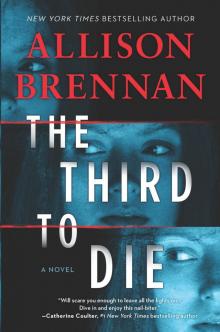 The Third to Die
The Third to Die Nothing to Hide
Nothing to Hide No Way Out
No Way Out Cold as Ice
Cold as Ice Cut and Run
Cut and Run No Way Out (Lucy Kincaid Novels)
No Way Out (Lucy Kincaid Novels) Storm Warning
Storm Warning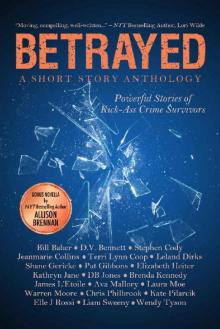 Betrayed: Powerful Stories of Kick-Ass Crime Survivors
Betrayed: Powerful Stories of Kick-Ass Crime Survivors Killing Fear pb-1
Killing Fear pb-1 Make Them Pay
Make Them Pay The Lost Girls
The Lost Girls Stalked
Stalked Killing Justice
Killing Justice A Deeper Fear
A Deeper Fear Poisonous
Poisonous Fear No Evil
Fear No Evil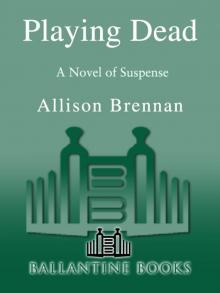 Playing Dead
Playing Dead Cold Snap
Cold Snap Vacation Interrupted
Vacation Interrupted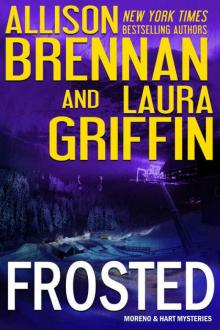 Frosted (Moreno & Hart Mysteries)
Frosted (Moreno & Hart Mysteries)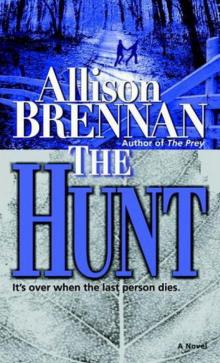 2 - The Hunt
2 - The Hunt Stolen
Stolen No Good Deed
No Good Deed Cutting Edge
Cutting Edge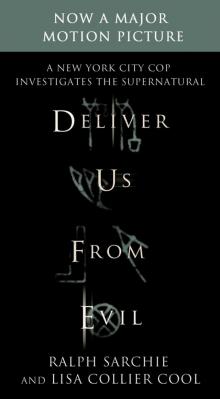 Deliver Us from Evil
Deliver Us from Evil If I Should Die
If I Should Die Speak No Evil
Speak No Evil Silenced lk-4
Silenced lk-4 Original Sin sds-1
Original Sin sds-1 Kiss Me, Kill Me lk-2
Kiss Me, Kill Me lk-2 What You Can’t See
What You Can’t See See No Evil
See No Evil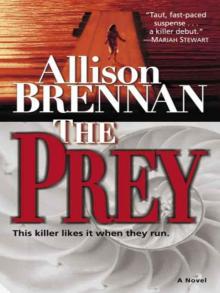 The Prey
The Prey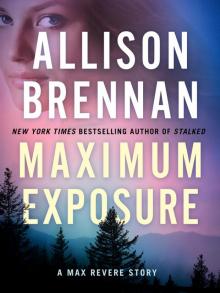 Maximum Exposure
Maximum Exposure Fatal Secrets f-2
Fatal Secrets f-2 Stalked lk-5
Stalked lk-5 Cutting Edge f-3
Cutting Edge f-3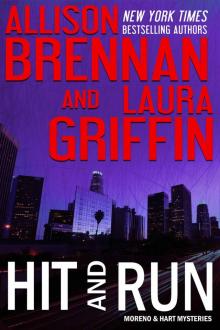 Hit and Run (Moreno & Hart Mysteries)
Hit and Run (Moreno & Hart Mysteries) Sudden Death f-1
Sudden Death f-1 If I Should Die lk-3
If I Should Die lk-3 Notorious
Notorious Abandoned
Abandoned Fatal Secrets
Fatal Secrets The Hunt
The Hunt Carnal Sin sds-2
Carnal Sin sds-2 Love Is Murder
Love Is Murder Lost and Found
Lost and Found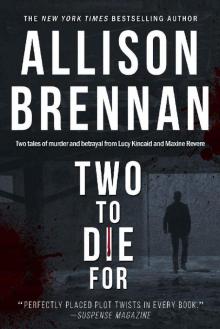 TWO TO DIE FOR
TWO TO DIE FOR Breaking Point
Breaking Point Best Laid Plans
Best Laid Plans Carnal Sin
Carnal Sin Silenced
Silenced Dead Heat
Dead Heat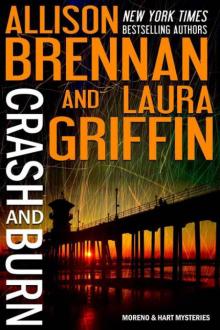 Crash and Burn
Crash and Burn Sudden Death
Sudden Death Lucy - 05 - Stalked
Lucy - 05 - Stalked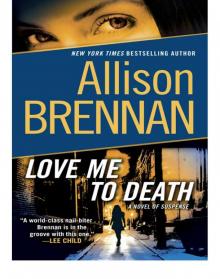 Mortal Sin
Mortal Sin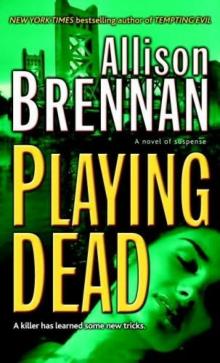 Playing Dead pb-3
Playing Dead pb-3 Kiss Me, Kill Me
Kiss Me, Kill Me Original Sin: The Seven Deadly Sins
Original Sin: The Seven Deadly Sins See No Evil e-2
See No Evil e-2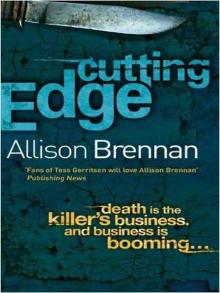 Cutting Edge: A Novel of Suspense
Cutting Edge: A Novel of Suspense Original Sin
Original Sin Too Far Gone
Too Far Gone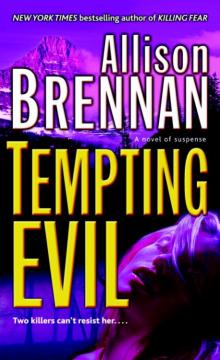 Tempting Evil
Tempting Evil Shattered
Shattered Killing Fear
Killing Fear Murder in the River City
Murder in the River City Love Is Murder (lucy kincaid)
Love Is Murder (lucy kincaid) Stolen (Lucy Kincaid Novels)
Stolen (Lucy Kincaid Novels)